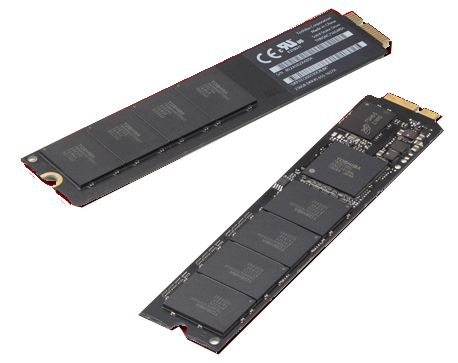Toshiba unveils thin, blade-style SSDs
Nov 8, 2010 — by LinuxDevices Staff — from the LinuxDevices Archive — 2 viewsToshiba announced a new line of SSDs (solid state drives) it claims are the industry's thinnest. The Blade X-gale devices are available in 64GB, 128GB, and 256GB capacities, according to the company.
Toshiba says its new Blade X-gale devices measure a little more than four inches long and one inch wide. At 2.2 mm, or less than 0.09 inches, the 64GB and 128GB drives are about as thick as an engraving knife or lenses for polarized sunglasses.
Based on Toshiba technology that mounts two 128GB drives back to back, the 256GB drives are slightly thicker, measuring less than 0.15 inches, or 3.7mm, according to the electronics giant.

Toshiba's Blade X-gale
Touted as suitable for "tablet PCs, laptops, mini-mobile, and netbook PCs," the Blade X-gale devices could, of course, also show up in future embedded devices. They appear to be the same SSDs that are being offered, in all three capacities, in Apple's latest MacBook Air, which recently garnered a favorable review from our sister publication eWEEK.com.
The super-slim 64GB and 128GB drives barely tip the scales at 0.3 ounces, while the not-as-slim 256GB drive weighs in at half-an-ounce, Toshiba said.
| THNSNC064GMDJ | THNS NC 128GM D J | THNSNC256GMDJ | ||
| Capacity | 64GB | 128GB | 256GB | |
| Interface | SATA 2.6 (3Gbps) | |||
| Voltage | 3.3V | |||
| Read Speed | Maximum Speed 220MB/s (sequential mode) | |||
| Write Speed | Maximum Speed 180MB/s (sequential mode) | |||
| Size (mm) | Width: 24.0 mm Height: 2.2 mm Length: 108.9 mm |
Width: 24.0 mm |
||
|
Weight |
9.8g | 13.2g | ||
| MTTF | 1 million hours | |||
Features of the new drives
Source: Toshiba
The modules are 42 percent thinner than a typical mSATA SSD, said Toshiba. Both SATA and Half-Slim SSD versions of the 64GB and 128GB modules are available, giving designers some flexibility in designing their hardware, the company added.
"It is really interesting to watch the march to higher-density and lower-priced SSDs and the effect that is going to have on the mobile space," said Al Hilwa, the program director of IDC's Applications Development Software group.
Based on a 3Gbps SATA interface, the drives have a maximum sequential read speed of 220MB per second and a maximum sequential write speed of 180MB per second, said Toshiba.
SSDs offer superior speed, durability and power efficiency compared to traditional hard drives, and mobile device manufacturers are making the switch as demand surges for smart devices like phones and tablets. Solid state drives also tend to last longer and have fewer data-loss issues.
Toshiba is not one of the three companies — Seagate, Western Digital, and Hitachi — that dominate the HDD industry. Even so, Toshiba touts itself as the world's "most experienced" and "second largest" producer of NAND-type Flash memory. The company said high-density NAND technology has the capability to come up with even smaller form factors.
Scott Nelson, vice president of the memory business unit in Toshiba America's electronic components division, stated, "Delivering a product that enables superior user experience in a smaller footprint is the ultimate goal."
Toshiba said it will continue working on even smaller solid state drives with higher storage capacities.
Further information
More information on Toshiba SSDs may be found on the company's website, here.
Fahmida Y. Rashid is a writer for our sister site eWEEK.com.
This article was originally published on LinuxDevices.com and has been donated to the open source community by QuinStreet Inc. Please visit LinuxToday.com for up-to-date news and articles about Linux and open source.